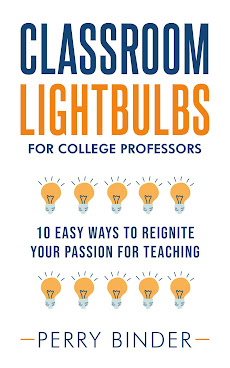
Below is an interesting Op-Ed in The NY Daily News - I agree with the tone of this piece, to give more freedom to teachers in the classroom. However, overthrowing an entrenched bureaucracy is a daunting task, and more immediate impactful suggestions are needed. For the short term, rather than asking what's wrong with K-12 education, I would ask each school the opposite question (as I quote from the book
Switch: How to Change Things When Change Is Hard): "What's working right now" at your school?
To me, what's working right now is that there are so many talented teachers who are doing great things, while toiling in anonymity. That is the main reason I created
The Inspiring Teacher Series - to highlight the inspiration so evident in these teachers. So why don't we give financial or other incentives to the superstar teachers to mentor other teachers in your own school? With meaningful feedback for other teachers.
Over the years, I’ve spent a lot of time thinking on how best to connect with people to get them excited and engaged, whether in a classroom, boardroom, or bored room. I believe that if you show learners that you have a sincere stake in their futures, you have the ability to inspire them on a daily basis, and spark a “light bulb moment.” And if teachers commit to a sincere interest in each other's future, that level of commitment will become evident to the students, and learning will be infectious.
My mantra: Learn from each other and grow as a team. Borrow the best classroom secrets from each other, just as comics observe great comics to improve their own material and delivery.
Op-Ed by Philip K. Howard
Free the teachers: Give classroom educators, suffocated by bureaucracy, freedom to inspire students Cathie Black, the controversial choice as New York City's schools chancellor, hasn't been saying much lately about her theories of education. But in her 2007 book, "Basic Black," she had this to say about what makes a good teacher: "The best educators bring an instant smile to your face." The worst ones, she went on, "were the ones who seemed to be on automatic pilot, teaching out of a sense of duty rather than joy, and just counting the months or years until retirement. These teachers lacked authenticity in their work ...Inspiration is what makes a good teacher. Just as Black remembers, the good teachers are the ones who have that spark, that spontaneity, that essential honesty. The good teacher inspires her students to respect her and listen to what she has to say. These traits of personality cannot be taught.
Read more:
http://www.nydailynews.com/opinions/2010/11/28/2010-11-28_free_the_teachers_give_classroom_educators_suffocated_by_bureaucracy_freedom_to_.html#ixzz16xZmyxiU
















.jpg)